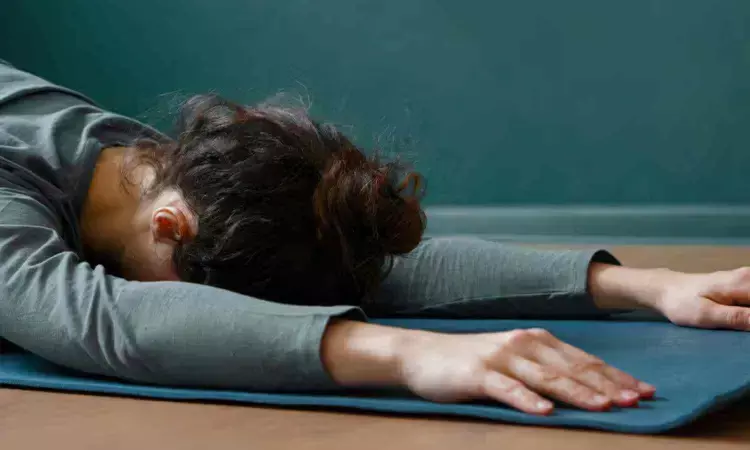- Home
- Medical news & Guidelines
- Anesthesiology
- Cardiology and CTVS
- Critical Care
- Dentistry
- Dermatology
- Diabetes and Endocrinology
- ENT
- Gastroenterology
- Medicine
- Nephrology
- Neurology
- Obstretics-Gynaecology
- Oncology
- Ophthalmology
- Orthopaedics
- Pediatrics-Neonatology
- Psychiatry
- Pulmonology
- Radiology
- Surgery
- Urology
- Laboratory Medicine
- Diet
- Nursing
- Paramedical
- Physiotherapy
- Health news
- Fact Check
- Bone Health Fact Check
- Brain Health Fact Check
- Cancer Related Fact Check
- Child Care Fact Check
- Dental and oral health fact check
- Diabetes and metabolic health fact check
- Diet and Nutrition Fact Check
- Eye and ENT Care Fact Check
- Fitness fact check
- Gut health fact check
- Heart health fact check
- Kidney health fact check
- Medical education fact check
- Men's health fact check
- Respiratory fact check
- Skin and hair care fact check
- Vaccine and Immunization fact check
- Women's health fact check
- AYUSH
- State News
- Andaman and Nicobar Islands
- Andhra Pradesh
- Arunachal Pradesh
- Assam
- Bihar
- Chandigarh
- Chattisgarh
- Dadra and Nagar Haveli
- Daman and Diu
- Delhi
- Goa
- Gujarat
- Haryana
- Himachal Pradesh
- Jammu & Kashmir
- Jharkhand
- Karnataka
- Kerala
- Ladakh
- Lakshadweep
- Madhya Pradesh
- Maharashtra
- Manipur
- Meghalaya
- Mizoram
- Nagaland
- Odisha
- Puducherry
- Punjab
- Rajasthan
- Sikkim
- Tamil Nadu
- Telangana
- Tripura
- Uttar Pradesh
- Uttrakhand
- West Bengal
- Medical Education
- Industry
Exercise relieves stress and fatigue in exhaustion disorder: Study

A study published in BMC Psychiatry found that 22-minute exercise sessions significantly reduced fatigue and stress in Exhaustion Disorder patients compared to healthy individuals, with greater energy increases after moderate-intensity exercise. However, anxiety reductions were similar in both groups. These psychological responses highlight the feasibility of designing tailored exercise interventions for Exhaustion Disorder patients.
Understanding psychological responses to acute exercise, defined as a single bout of physical exercise, in clinical populations is essential for developing tailored interventions that account for the psychological benefits and challenges of exercise. Given its effectiveness in reducing symptoms in various psychological disorders, exercise should be further explored in Exhaustion Disorder ICD-10-SE: F43.8A (ED), characterized by persistent exhaustion following long-term psychosocial stress. Currently, no studies address the psychological responses to acute exercise in Exhaustion Disorder patients.
This study aims to (1) compare the psychological responses to acute exercise between Exhaustion Disorder patients and healthy controls and (2) assess response differences between low and moderate exercise intensities. They conducted a two-armed cross-over trial comparing Exhaustion Disorder patients (n = 30) and healthy controls (n = 30). Participants completed a 22-min exercise at low or moderate intensity on a cycle ergometer, on separate occasions, in randomized order.
The primary outcome was perceived fatigue (POMS); secondary outcomes included feelings of energy, anxiety, stress, exertion, and psychological discomfort, measured before, during, and up to 24 h post-exercise. Exercise effects were assessed using repeated measures analysis of variance. Results: Exhaustion Disorder patients reported higher levels of exertion, psychological discomfort, fatigue, anxiety, and stress but lower energy throughout the trial compared to controls. Unlike controls, the Exhaustion Disorder group showed significant fatigue and stress reductions post-exercise (p < 0.05).
Additionally, Exhaustion Disorder patients showed a more elevated energy after moderate-intensity exercise compared to controls (p < 0.05). Both groups experienced anxiety reductions post-exercise, with no group interactions over time. No differences were observed between pre- and 6 or 24 h post-exercise in any variables. The only intensity effect (p < 0.05) in the Exhaustion Disorder patients was a more pronounced energy decline 30 min after moderate-intensity exercise. A 22-min exercise session was perceived as more strenuous by patients with exhaustion disorder (ED) and generated greater improvements in feelings of fatigue, energy, and stress compared to healthy individuals without delayed negative effects. These findings highlight the specific psychological responses in Exhaustion Disorder to exercise and can inform intervention design tailored specifically to this population.
Reference:
Kling, J., Persson Asplund, R., Ekblom, Ö. et al. Psychological responses to acute exercise in patients with stress-induced exhaustion disorder: a cross-over randomized trial. BMC Psychiatry 25, 72 (2025). https://doi.org/10.1186/s12888-025-06484-1
Dr. Shravani Dali has completed her BDS from Pravara institute of medical sciences, loni. Following which she extensively worked in the healthcare sector for 2+ years. She has been actively involved in writing blogs in field of health and wellness. Currently she is pursuing her Masters of public health-health administration from Tata institute of social sciences. She can be contacted at editorial@medicaldialogues.in.
Dr Kamal Kant Kohli-MBBS, DTCD- a chest specialist with more than 30 years of practice and a flair for writing clinical articles, Dr Kamal Kant Kohli joined Medical Dialogues as a Chief Editor of Medical News. Besides writing articles, as an editor, he proofreads and verifies all the medical content published on Medical Dialogues including those coming from journals, studies,medical conferences,guidelines etc. Email: drkohli@medicaldialogues.in. Contact no. 011-43720751


